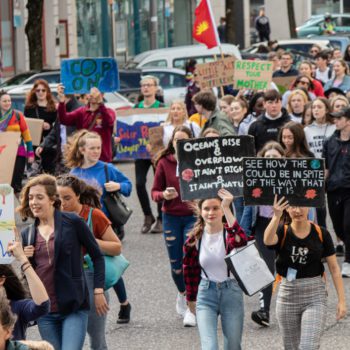Did you know that 44 nations could disappear under the sea within your lifetime? Pacific Islanders face a desperate need for climate action.
The communities act as a voting block in international climate change negotiations called The Alliance of Small Island States (AOSIS). For them, the threat of climate change is of daily concern.
A traditional Fijian canoe in the Fiji pavilion at the 23rd International Conference for the Parties (COP 23) in Bonn served as a symbol of resistance and unity to compel delegates to act on climate change.
Pacific islanders on climate action
A Lifestyle Tied to the Sea
3,000 years ago, people began to inhabit the Pacific islands. The culture of Pacific islanders revolves around the ocean, with their access to resources inextricably tied to the ocean’s bounty. Over time, the island lifestyle has adapted as climate change became an increasing threat.
Once a friend and a reliable provider, the ocean has become a “false friend,” that can turn into an attacker at any moment, destroying the livelihood of its dependents.
Islands are vulnerable to a laundry list of climate effects, from the more obvious sea level rise and temperature increases to coral bleaching, ocean acidification, the frequency of tropical cyclones, and shoreline erosion.
These effects together threaten fish supply, a livelihood and key source of food. 7 out of the top 10 countries that depend on fish and seafood as a primary food source are small island developing states.
Negotiating for the Planet’s Future
Back in 2017, I had the privilege to attend as a student observer at the United Nations Framework Convention on Climate Change (UNFCCC) International Conference of the Parties (COP 23) in Bonn, Germany.
In short, this is the annual gathering of the signatories of the Paris Agreement, the iconic, first-of-its-kind global agreement where 188 states and the EU (representing more than 87% of global emissions) committed to reducing greenhouse gas emissions to fight climate change.
Notably, the U.S. decided to bail on it in 2017.
In Bonn, I was fortunate to hear from delegates from around the world speaking about their country’s own experience with climate change.
The most striking presentation involved a group of representatives of the SIDS (small island developing states). The Pacific Climate Warriors spoke about the urgency of their daily and ever-present struggle against climate change.
The words of Billy Cava, a Climate Warrior from New Caledonia, an island chain located in the South Pacific, have stayed with me since.
“As Pacific Climate Warriors, we want to hold the world accountable. We demand that the world move away from fossil fuels and invest in 100% renewables, not just for us, but for generations to come.”—Billy Cava, New Caledonia
This moral and emotional call to action exemplifies the plight of the 52 small island developing nations.
Responsibility to Mitigate, Necessity to Adapt
To secure a future above water, the challenge for these nations will be to follow a trajectory of sustainable development, where they can build wealth and nourish their economy, while also protecting the environment and keeping emissions low.
But is it fair to ask that they focus on keeping emissions low as the waters rise, threatening to sweep their homes and families with it?
When it comes to climate action, the narrative from islanders skews significantly toward adaptation rather than mitigation. Mitigation speaks to the need to decrease the use of fossil fuels and associated greenhouse gas emissions, while adaptation refers to adjusting way of life to respond to the effects of climate change.
The core debate at international climate negotiations centers on this tension. The combined contribution of the islands accounts for less than 1% of global emissions, while the US is responsible for 14% and China is responsible for 28%.
The AOSIS, along with other developing nations, call on countries like China and the US, whose economies are responsible for a lion’s share of the the emissions that have warmed the atmosphere to the point that the waters are rising to overtake small islands today, to shoulder the burden of mitigation and transform their economies to achieve sustainable development.
Climate Action in the Islands, Head Above Water
A 2008 UN report found that the response of island nations to climate change is largely project-based, ad hoc, and heavily dependent on external resources. Australia and New Zealand have contributed financial support to adaptation efforts.
However, the top-down approach to technical assistance and financial distribution prevents financial flows and relevant information from reaching rural communities and fails to build capacity to continue climate action in the absence of funding.
Though many islanders are aware of present-day environmental changes, their understanding of the nuances of climate change is limited, particularly among the older generations.
A survey of people from Kiribati and Vanuatu, outer island communities in Fiji, found that most islanders had no understanding of the word “climate change,” though they recognized that the environment was, indeed, changing. Even more promising, young islanders are becoming increasingly aware of the long-term impacts of climate change because of resource limitations.
Community activism for Pacific Islanders
Community-based environmental governance is common in the region. Unfortunately, this has led to some uncoordinated climate responses with unexpected negative effects.
For example, building seawalls to adapt to sea level rise and clearing vegetation has further exacerbated coastal erosion. It is imperative to enhance climate literacy in the islands in order to build capacity for these vulnerable island communities to take effective climate action.
However, many islands are also showing significant progress and leadership in this space. For example, the Maldives, reeling from the devastating effects from the 2004 tsunami, committed to complete carbon neutrality.
The SIDS voting block also lobbied the UN Human Rights Council to pass a resolution that explicitly recognizes climate change as “an immediate and far-reaching threat to people and communities around the world.”
Imagine that ~radical~ idea– considering a safe and sustainable planet as a human right (over 100 countries enshrine this right in their constitution). Three islands have already disappeared in the past year alone.
In order for the rest to have a shot at treading water, the international community must mobilize to share money and technical assistance in order to build capacity for island nations to adapt and respond to climate change.
Even more essential, developed nations must shift away from the current economic system that sacrifices nature and accelerates the potential to drown nations for short-term profit toward a system that values people and planet as much, reducing emissions, to secure a healthy and livable future for all the Earth’s inhabitants.
For Pacific Islanders, climate action is more than just a school project, it is an existential threat.













No Comments